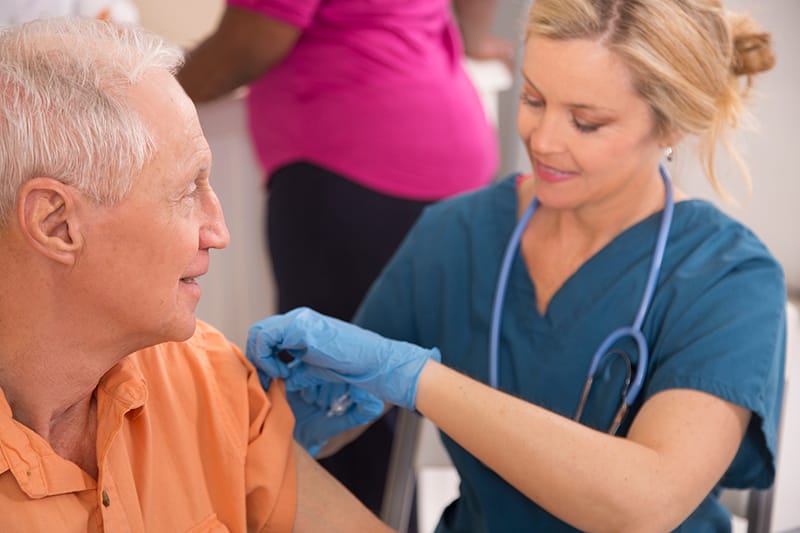"If you've ever known anyone who's had pneumonia, you know it's a devastating condition."
Dr. Benjamin Monson, MD, an internist at The Iowa Clinic in West Des Moines, would know. Up to eight percent of the patients he sees have the condition, and it's often a cause for hospitalizations or intensive care. In Iowa alone, more than 500 people die from pneumonia and flu complications each year, placing it consistently in the top 10 causes of death in the state.
Before you freak out, only 10 percent of pneumonia cases lead to the end, and the severity of the condition is largely preventable — thanks to vaccines.
How do you even get pneumonia?
"It can be acquired a variety of ways. It's not uncommon — this bug is living on our skin. It's everywhere," says Dr. Monson. "Your skin is a good defense barrier against the bacteria and viruses that cause pneumonia. But when enough of this bug gets into your lungs and lower respiratory tract, that's when problems occur."
In short, pneumonia is a fairly common infection of the lungs. Viruses are the cause a third of the time, according to the American Lung Association. And that includes flu viruses. Often, a case of the flu weakens your immune system, causing pneumonia if you've been exposed to the virus in enough concentration.
In other cases, bacteria is to blame. The bug that most commonly causes pneumonia and pneumonia-related deaths is called streptococcus pneumoniae. It's the same bacteria that causes ear infections in little kids and other respiratory illnesses.
Is there a pneumonia vaccine or other way to prevent it?
Actually, there's more than one.
"There are two different pneumonia shots. Pneumococcal is the abbreviated name for them. They combined the two words, streptococcus pneumoniae, to make the name for the vaccine," says Dr. Monson. "These shots work together to help reduce your chances of getting pneumonia. If you do get it, they decrease the chances that it's a severe case."
The two immunizations go by pneumococcal conjugate vaccine 13 (PCV13) and pneumococcal polysaccharide vaccine 23 (PPSV23). The numbers show how many types of bacteria each shot protects against — 13 for PCV13 and nearly twice that for PPSV23.
Recommended Immunization Schedule for Pneumococcal Vaccines
These vaccines immunize the population with the weakest immune systems: children and seniors. The pneumococcal conjugate vaccine is part of the recommended immunization schedule for all children. Kids are immunized against pneumonia before they turn two. Adults 65 and older get both the pneumococcal conjugate and pneumococcal polysaccharide vaccine, a year apart.
There are certain medical conditions that weaken the immune system. If you develop diabetes, heart problems, COPD or chronic kidney disease between the ages of 19 and 64, you should get PPSV23 early.
For PCV13, the list of conditions that affect your vaccination schedule is smaller. Adults with kidney failure, cochlear implants in their ears or a damaged or absent spleen need the shot earlier than 65.
"You can still get pneumonia after having had these shots, but hopefully the disease will be less severe and doesn't turn into an infection in your bloodstream, brain or spinal cord," says Dr. Monson. "Imagine the bacteria attacking a city with no defenses vs. attacking a city with 100 or 200 defenders. Those defenders are the antibodies that your body has built up as a result of the vaccine. It's going to be more difficult to beat them."
Other Ways to Prevent Pneumonia
Most people are only going to get a handful of pneumococcal shots in their lifetime. And those only protect against the bacteria that causes pneumonia, not the viruses. But if you get your annual flu shot, you're helping to prevent these viruses that can lead to pneumonia and keeping your immune system strong enough to fight them off.
Other than vaccination, Dr. Monson suggests you follow the basics of germ prevention:
- Don't smoke.
- Stay healthy.
- Wash your hands frequently, especially before eating.
- Avoid touching your face because you can transfer bugs.
- Stay hydrated.


